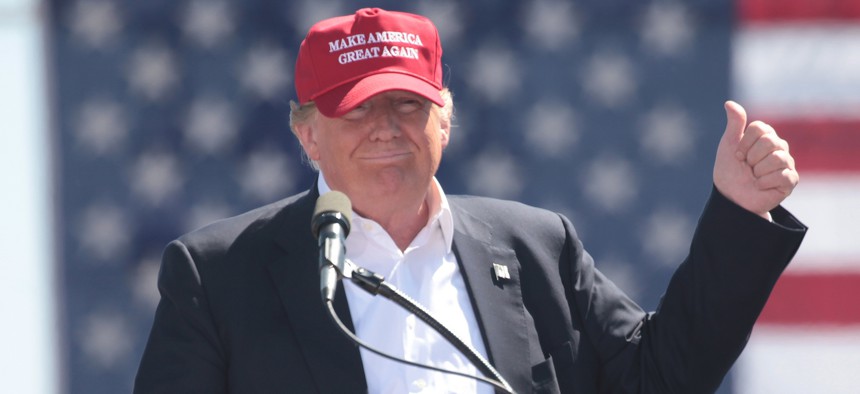
Flickr user Gage Skidmore
Will the Election End Eight Years of the White House Championing Workplace Diversity and Inclusion?
Trump can do more than just influence employer attitudes. As president, he'll appoint the chair of the EEOC.
The first bill Barack Obama signed into law as US president was the Lilly Ledbetter Fair Pay Act, which made it easier for women to sue over pay discrimination. In the ensuing eight years, attention paid to issues of diversity and equality in the workplace has grown, even if actual results have been frustratingly slow to come by. Obama championed the cause, and directed his administration to advance it.
It’s unlikely president Donald Trump will share Obama’s priorities.
Trump spent his campaign railing against political correctness, and made numerous inflammatory comments about women, Mexicans, and immigrants. He mocked a disabled reporter, and one of his first White House appointments is of Steve Bannon, who criticizes the push for equal rights as a cult of victimhood and whose Breitbart website gives a platform to misogyny.
The prospect of a rollback in rights has employees nervous. At Ernst & Young, Karyn Twaronite, the firm’s global diversity officer, said she received 300 emails—about double her normal inflow—the day after the election. Employees had specific questions about their immigration issues, about their legal status as same-sex couples, and about whether their adoptions as gay parents would proceed. Others were just scared, she said. “We don’t know where things are going,” Twaronite says, but she promises Ernst & Young will be “steadfast” in supporting a diverse workforce.
For business leaders who have been reluctant to embrace diversity, Trump’s actions and rhetoric may give them cover. “Companies who get it don’t need the government to mandate” diversity efforts, said Jonathan Segal, an employment attorney at Duane Morris LLP in Philadelphia. “Companies that don’t see it, and have only done it to be legally compliant, may be more lax.”
Trump can do more than just influence employer attitudes. As president, he’ll appoint the chair and chief counsel of the Equal Employment Opportunity Commission, which sets and enforces the rules against workplace discrimination. Next year, the EEOC will require employers to report data on pay sorted by race and gender, allowing the commission to target employers who underpay women and minorities. Republicans in Congress are opposed to the new rule, and it’s possible Trump may modify it, or scrap it altogether.
Last month, EEOC published a five-year plan to advance equal pay for women and other groups, while addressing pay disparities for temporary and other non-traditional workers. That plan has also been criticized by Republicans who would rather the commission focus on clearing its existing backlog of discrimination cases, and Trump’s appointees may well roll it back, according to a report by Littler Mendelson, a law firm that deals in employment law.
Trump also could reverse Obama’s executive order prohibiting federal contractors from discriminating based on sexual orientation or gender identity.
If the government doesn’t lend its weight to promoting workplace equality, and employers exploit its absence, employees will still have recourse: the courts. Segal expects an increase in litigation if workers feel their rights are violated.
“The anger has to go somewhere,” Segal said. “Employees cannot change Washington but they can sue their employer.”
(Image via Flickr user Gage Skidmore)






